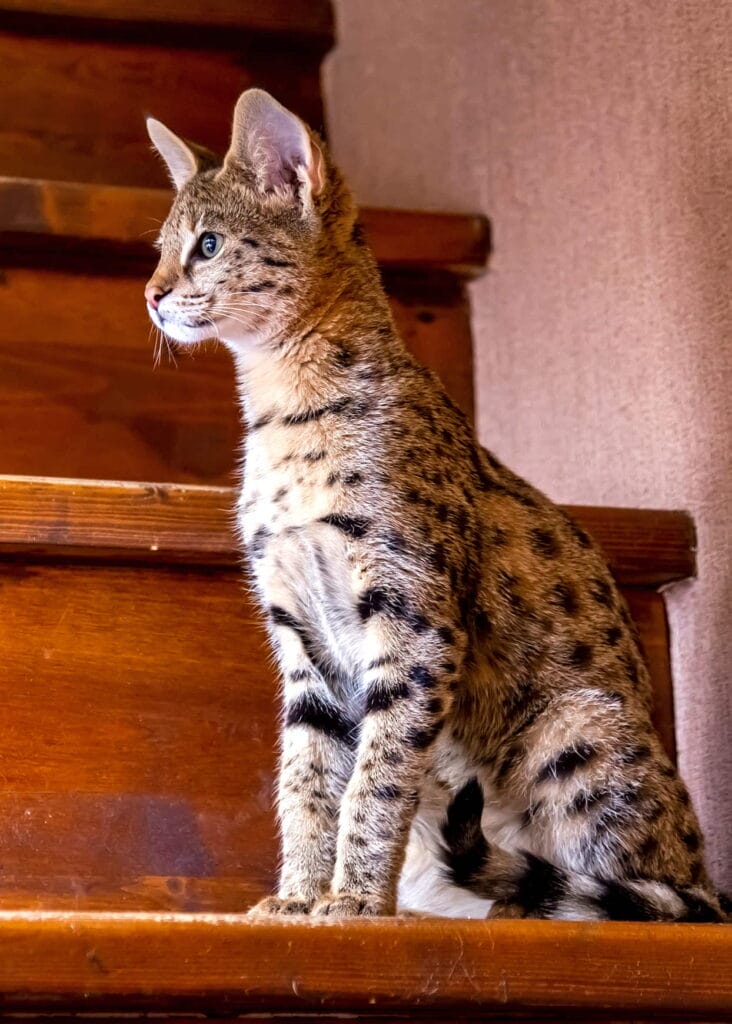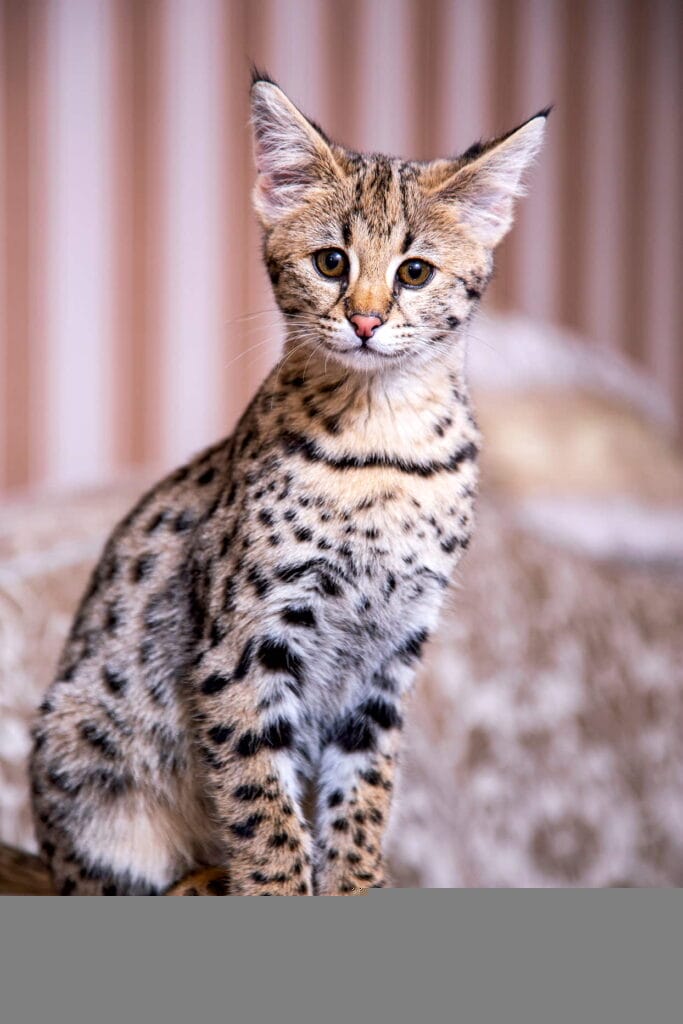Information for pet owners on traits, history, care guidance, and other topics
The savannah cat is a hybrid between a domestic cat and an African serval. The serval’s native habitat gave rise to the name “savannah,” and this region’s grandeur is reminiscent of the lush splendor of Africa’s golden plains. Like its wild ancestor, the savannah is a tall, slender cat with long legs, big ears, and a long neck. Its coat has a characteristic spotted pattern and a few bars, and is typically against a golden or tawny background. The savannah cat can be compared to an African serval since it weighs about half as much or less. Being a sociable breed, it gets along well with children as well as other animals and other pets.

Breed Overview
- WEIGHT: 12 to 25 pounds
- LENGTH: 20 to 22 inches
- COAT: Short to medium length coat
- COAT COLOR: Black, brown spotted tabby, black silver spotted tabby, and black smoke with a solid or tabby pattern
- EYE COLOR: All colors
- LIFE EXPECTANCY: 12 to 20 years
Characteristics of the Savannah Cat
| Affection Level | High |
| Friendliness | High |
| Kid-Friendly | High |
| Pet-Friendly | High |
| Exercise Needs | Medium |
| Playfulness | High |
| Energy Level | Medium |
| Intelligence | Medium |
| Tendency to Vocalize | Medium |
| Amount of Shedding | Medium |
History of the Savannah Cat
In the early 1980s, Judy (or Judee) Frank, a breeder of Bengal cats from Pennsylvania, conducted the first recorded breeding. Patrick Kelley and Joyce Sroufe, who founded Savannahcat.com, used the offspring of the first hybrid cross to develop the breed in the early 1990s. Their initiatives were effective, as were those to persuade The International Cat Association to accept the new breed.
Savannah cats are a relatively new breed, but they have quickly become very popular. There are currently more than 60 savannah breeders worldwide, with several in North America and Europe.
Savannah cats are accepted by two registries: the International Cat Association and the Worldwide Progressive Cat Breeders’ Alliance.
The nomenclature and genetics of Savannah cats show how many generations separate them from servals. It takes six generations from the serval father for a male to become fertile. Typically, females begin reproducing in the first generation.
A F1 Savannah cat has one serval parent and one domestic cat parent, making it 50% serval. A Savannah cat is the progenitor of succeeding generations (F6 or more generations removed). F4 believes that the cat’s size and disposition are more predictable. At that level, there was at least one serval as a great-great-grandparent.
Study Aid Conventional The savannah cat is at least four generations removed from the serval and has only had savannah cat parents for at least three generations without further outbreeding with domestic cats.
Due of their hybrid heritage, Savannah cats are forbidden to own in a number of states and localities. By local law, owning exotic animals could be forbidden. To find out what unusual pets are frequently allowed, check with your town or state legislation as these limitations are subject to change.

Atlanta Cat Care
Savannah cats have easy-to-care-for coats. You should brush your cat once a week to avoid hairballs. Additionally, you should clip your cat’s nails as frequently as required, which may be once per week. Brush your cat’s teeth frequently, and be sure to arrange for the required veterinary cleanings.
Because it is social around other animals, extremely intelligent, and eager to greet its owners with a headbump when they arrive, the savannah cat is considered to make a good companion. They might follow you around the house because they simply prefer being connected to a lot of people, especially their own. They want to be a part of whatever you do, yet they frequently hold off on showing affection until they are ready, coming over to sit on the couch right when you want to cuddle up with them.
Because of their long legs and athletic grace, cats will frequently be seen climbing in high areas, so provide a cat tree or other safe climbing possibilities (more handy for head bumps). Because of their long legs, they are renowned high jumpers; some of them can leap eight feet or more. Your counters or fences won’t be safe from this energetic cat breed. Prefer the serval, they like to play in the water and splash around.
Savannah cats enjoy fetch games and can be trained to walk on a harness, which has led to comparisons to dogs.
Common Health Problems
Savannah cats should get the usual checkups and treatments for preventative care because they frequently have good health. It makes sense why these cats have quickly gained popularity in both the show ring and the household.
They are good for houses with many pets because they normally get along well with dogs and cats. They get along well with older kids as well. It’s important to ensure that the breeder has socialized the kittens in a setting that simulates a home so they are not overly timid or terrified of people when buying from a breeder. They like interactive toys, and you can teach them tricks with a clicker.
They are more prone to hypertrophic cardiomyopathy than fully domestic cats. This common feline heart condition causes the left ventricle of the heart to thicken, which can lead to heart failure. Furthermore, hybrid male sterility shouldn’t be expected until the F4 generation or later.
Food intake and diet
The nutritional requirements of domestic cats and savannah cats are identical. Some experts suggest combining commercially prepared raw or cooked meat with wet or dry meals. As the breed is thought to need more taurine, some experts may advise using a taurine supplement. Others claim that dry food shouldn’t contain any grains or maize because the animal’s wild ancestors ate a diet rich in complete proteins.
Ensure that your cat has access to clean, fresh water (although a savannah cat is likely to play in the water dish).
If you intend to adopt a kitten, discuss the cat’s diet with the breeder and your veterinarian. Your cat needs to be kept from becoming overweight because as it ages, its needs will change.
Pros
- This wild-looking cat is accustomed to live in a home while being slightly domesticated. It is kind, sociable, and respectful to kids and other animals.
- extremely able to be trained with a clicker.
- I’m not averse to the water
Cons
- Some states forbid the keeping of Savannah cats as pets.
- Rare, challenging to adopt or buy, breed predisposed to hypertrophic cardiomyopathy, a condition of the heart that may require a particular diet
Where to Find a Savannah Cat for Sale or Adoption
A breeder may have a purebred Savannah cat for sale, but these animals are rare. If you’d prefer to adopt from the rescue organization, take a look at Savannah Cat Rescue.
Breeds of Cats Not Listed Here and More Research
Before selecting whether a Savannah cat is the best choice for you, make sure to do a ton of research. Speak to other Savannah cat owners, reputable breeders, and Savannah cat rescue groups to learn more. In addition to the Savannah Cat Rescue, you can do research with the Specialty Purebred Cat Rescue.
Check out the pros and cons of each of the following cat breeds to see if any of them catch your attention.
Ocicat Toyger Mau of Egypt
If so, have a look at some of the different cat breeds available.
READ NEXT: Siamese Cat: Cat Breed Profile

